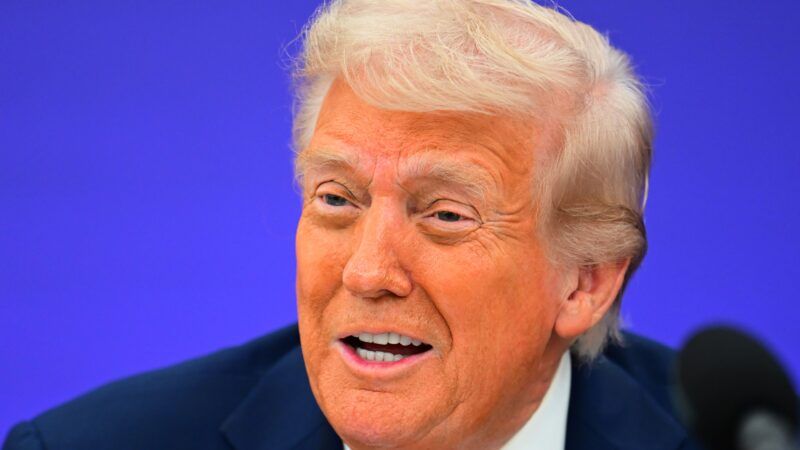Trump Is Embracing 'Daddy State' Economics
Markets thrive on predictable rules, but when the president takes equity stakes or pressures firms at will, investment and risk-taking give way to hesitation.

The question of whether President Donald Trump has turned the United States toward a new "state capitalism"—one in which the government is not just economic referee but active player—has been answered. His second term brings policies that go well beyond traditional Republican pro-market orthodoxies, such as tax cuts and deregulation, and into direct involvement with production and capital. Yet this doctrine is less a coherent grand strategy than a set of ad hoc deals, sometimes pro-market and sometimes interventionist.
Some Trump policies—tax cuts, deregulating, talk of budget-deficit reductions—retain a traditional Republican tone. On the other hand, this administration's protectionism and tariffs would have been inconceivable a decade ago. Republicans would also traditionally label the government's acquisition of a 10 percent stake in Intel as socialism if proposed by anyone other than Trump. And other policies have the feel of mafia tactics made possible by the exercise of leverage, like letting Nvidia and AMD sell their chips to China in exchange for a 15 percent cut back to the U.S. government.
Trump also departs markedly from the past GOP playbook in his lack of recognition that the market allocates resources much better than politicians and bureaucrats do. He treats the market as a stage for negotiation to reorganize the world's economies. Old-guard Republicans were globalists, whereas Trump built his appeal on "America First" nationalism and protectionism.
Earlier Republicans valued predictable rules, but as Cambridge legal scholar Antara Haldar noted in a Project Syndicate symposium this month assessing the direction of "Trumponomics," the president "is willing to break any rule, norm, or promise…in the name of striking ad hoc corporate-style 'deals.'" Where conservative-minded leaders of the past obscured the state's role, Trump "flaunts it."
Yet Haldar correctly argues that Trump's approach differs from other forms of heavy-handed state control. It is neither the Chinese model nor that of the developmental state. It is "erratic, transactional, and short-sighted" and a rejection of the "quietly overbearing 'Nanny State'…in favor of a commanding, patriarchal 'Daddy State.'"
Princeton University historian Harold James, another participant in the symposium, sees Trump as a break from the past due to his revival of state-directed "industrial policy." This started under former President Joe Biden's administration, but there is no doubt that Trump's pursuit of a manufacturing revival and reshoring of global supply chains, along with his tariffs and equity stakes in private companies and his overall aim to rebuild U.S. strategic capacity, fall well into that category.
Unfortunately, as James argues, Trump's brand of industrial policy encourages "hyper-activist corporate lobbying, with large and well-connected enterprises getting the best 'deals.'" In my opinion, all industrial policies end up this way, not just Trump's.
In this case, I find it particularly interesting that even industrial-policy advocates like Mariana Mazzucato, author of The Entrepreneurial State, seem displeased with Trump's version. Done right, she claims in her contribution, industrial policy can support innovation and inclusive growth. She sees Trump's approach as "gestures without purpose, interventions without coordination, and spending without strategy."
That's because Trump's approach isn't part of any coherent vision. It's just transactional. He looks at it in isolation, and if he believes it is a good deal, he does it. That's what makes the behavior especially damaging: It creates profound uncertainty. Markets thrive on predictable rules, but when the president takes equity stakes or pressures firms at will, investment and risk-taking give way to hesitation.
Soon, companies learn that success depends less on innovation or competition than on currying political favor. Resources shift from productive activity to lobbying, undermining both fairness and growth. Because these actions are purely transactional, they entrench the worst aspects of state capitalism: politicized resource allocation, favoritism for the well-connected, and erosion of the rule of law. This isn't new, but Trump brings a new scale and unique pride in breaking with time-honored conventions of governing.
The inevitable result is slower growth, less dynamism, and a political economy driven by rent-seeking instead of entrepreneurship.
Michael Strain of the American Enterprise Institute, however, reminds us that despite Trump's many exercises in state capitalism, his most enduring legislative achievement, the One Big Beautiful Bill Act, moves the tax code in a more pro-market direction. Strain concludes that the old classical liberal consensus will endure because its past success "will help to ensure its longevity."
Boy, do I hope he's correct. The risk is not that Trump has built a sustainable model of state capitalism but that his erratic improvisation is eroding institutional safeguards and trust in markets without delivering durable alternatives.
So, is Trump a state capitalist? He certainly acts like one, but "daddy capitalist" is more descriptive. This is little comfort.
COPYRIGHT 2025 CREATORS.COM


Show Comments (43)